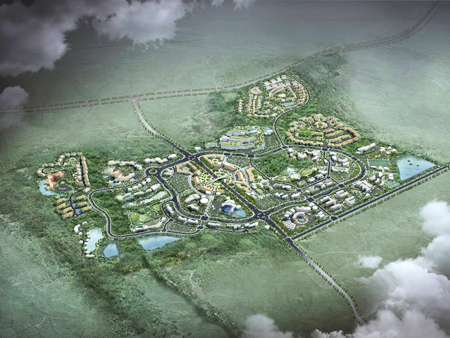Medical town due in Jeju
The Jeju Free International City Development Center (JDC) broke ground Tuesday for the Jeju Healthcare Town which it expects to be built by 2015.
It will be constructed on the Donghong-dong, Topyeong-dong sites in Seogwipo in the Jeju Special Self-governing Province and will be the first medical town in Korea to provide a variety of healthcare services at one site. It will offer medical check-up clinics, rehabilitation centers, medical research and development (R&D) centers, resort facilities as well as recreational facilities.
“A healthcare town is where everything about health is concentrated in one location. Although there are many of these in other countries, it is the very first to be built in Korea. Jeju is the perfect place for a healthcare town to be established not only because it has a great natural landscape but also because it has a clean environment and abundant natural resources,” said Byon Jong-il, chairman and CEO of JDC.
“Korea is also famous for its Oriental medicine. Jeju is a great place for medical tourism because it can combine such medicine with its environment.”


Sketch of the Jeju Healthcare Town in Seogwipo, Jeju Island. Planned to be completed by 2015, it will be the first medical town in Korea.
Kwon Do-youp, minister of land, transport and maritime affairs, Jeju Gov. Woo Keun-min, and Byon attended the groundbreaking ceremony on Tuesday along with lawmakers, council members, and businessmen from the medical industry.
The healthcare center will be built on a 1.54 million-square-meter site, 34 percent of which will be preserved as green areas. The town will have three different parks — the Wellness Park, the Medical Park, and the R&D Park — to provide specialized services to patients and visitors.
The Wellness Park will be a medical complex focusing on healthcare and recreation. The Medical Park will provide advanced medical services such as specialized hospitals and long-term care facilities. The R&D Park will be a research complex where medical research and bio-medicine studies will be conducted.
The town is one of six core projects to help the island become internationally recognized. The other five projects include a science park, global education city, resort-type residential complex, the Seogwipo tourism port, and a myths and history theme park.
The city aims to build the town into a global medical tourism site that attracts not only Korean patients but also those from abroad.
“We plan to attract medical tourists from abroad. We don’t have a specific target, but we expect there will be many Chinese tourists in the coming decade or two. So in the short term, we will focus on attracting Asian medical tourists,” said Byon.
“The town will provide clinics for internal medicine, orthopedics, cosmetic surgery, dentistry and more. The island’s clean natural environment will be perfect for treating seriously ill patients over a long period of time.”
JDC plans to connect local hospitals with foreign ones for active exchanges of medical services and know-how.
“We will support local hospitals to go global and foreign ones to share their know-how with Korean ones. Seoul National University Hospital will be participating in the project in a consortium. The hospital signed an MOU with the city in 2008,” said Byon.
If the healthcare town project is successful, Korea’s medical industry and Jeju’s economy are expected to grow as a result.
“The town will become a growth engine for medical tourism and industry if the government and citizens cooperate in their efforts. The Jeju Healthcare Town will be the first model and the pioneer project,” Kwon said. <Korea times/Yun Suh-young>
news@theasian.asia

























































